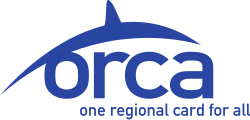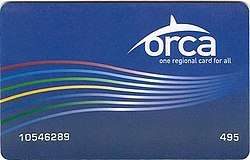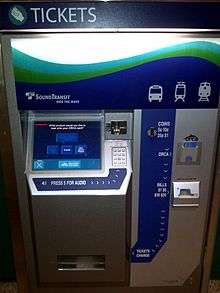ORCA card
The ORCA card (One Regional Card for All) is a contactless, stored-value smart card system for public transit in the Puget Sound region of Washington, United States. The card is valid on most transit systems in the Seattle metropolitan area, including Sound Transit, local bus agencies, Washington State Ferries, the King County Water Taxi, and Kitsap Fast Ferries. It was launched in 2009 and is managed by the Central Puget Sound Regional Fare Coordination Project, a board composed of local transit agencies.
  | |
| Location | Puget Sound region, Washington, U.S. |
|---|---|
| Launched | April 20, 2009[1] |
| Technology |
|
| Operator | Vix Technology |
| Manager | Central Puget Sound Regional Fare Coordination Project |
| Currency | United States dollar ($5 minimum load, $300 maximum load) |
| Stored-value | E-purse |
| Credit expiry | None |
| Auto recharge | Autoload |
| Validity | |
| Retailed |
|
| Variants |
|
| Website | orcacard.com |
The card is able to be loaded with "e-purse" value, similar to a debit card, and monthly passes. Cards are sold and reloaded at participating grocery stores, customer service centers, and ticket vending machines at transit stations. ORCA cards offer free transfers between transit systems within a two-hour window.
History
Central Puget Sound transit agencies have collaborated in a region-wide fare system since 1991 with the introduction of U-PASS and later FlexPass. In 1996, voters approved Sound Move, which called for an integrated regional fare policy for a "one-ticket ride".[3] That goal led to the creation of the PugetPass in 1999, which allowed transit riders to use a single pass for five transit agencies.[4]
On April 29, 2003, an agreement to implement a smart card system between the seven agencies in the Central Puget Sound Regional Fare Coordination Project (Sound Transit, King County Metro, Community Transit, Everett Transit, Pierce Transit, Kitsap Transit, and Washington State Ferries) was signed along with a US$43 million contract[1] awarded to ERG Transit Systems (now Vix Technology) as the vendor and system integrator of the project. The ORCA card was originally anticipated to be operational in 2006.[5]
Introductory phase
On Friday, April 17, 2009, ORCA announced a limited rollout of the regional smart card beginning April 20, 2009. The limited rollout allowed remaining technical issues in the system to be resolved. An extensive rollout and public outreach campaign followed in June 2009. Blank cards were available at no charge during the introductory period, but as of March 1, 2010, the card cost $5 ($3 for reduced fare permit holders). Users of PugetPasses, FlexPasses, and other passes were to be gradually transitioned to ORCA.[1]
Launch timeline
The ORCA launch press kit gave a launch timeline as follows:[6]
- April 17, 2009 – Press release announcing launch of ORCA.
- April 20, 2009 – Orcacard.com and 1-888-988-ORCA call center launches. Customer Service Offices begin ORCA card distribution.
- May 2009 – Sounder Ticket Vending Machines (TVMs) begin ORCA card distribution. "ORCA is Here" inserts and posters appear in Customer Service Offices and on board buses, trains, and ferries. Switch began of Reduced Fare customers and Business Accounts to ORCA (continued into 2010).
- June 2009 – "ORCA is Here!" radio and print ads and bus billboards appear. Public outreach campaign with blank card distribution.
- July 2009 – Link light rail service begins and Link TVMs begin ORCA card distribution.
- Jan 1, 2010 – Elimination of intersystem paper transfers.[7]
- Fall 2010 – The planned replacement of University of Washington student and employee ID cards with ORCA-integrated photo ID cards was delayed until sometime in 2011. The U-PASS and the King County employee passes were to be dual purpose passes and were to include the ORCA chip.[8]
Public beta test
Between November 9 and December 22, 2006, as many as 6,000 transit riders were asked to participate in a live test of the smart card system. The test was conducted on selected routes of the seven participating agencies.[4] The University of Washington conducted a separate test for integrating ORCA with the Husky Card and U-PASS during the same period.[9]
Technology
The card uses the ISO/IEC 14443 RFID standard.[10] Specifically, the MIFARE DESFire EV1 which "implements all 4 levels of ISO / IEC 14443A and uses optional ISO / IEC 7816-4 commands.".[11]
Agencies
ORCA is managed by the Central Puget Sound Regional Fare Coordination System, a joint board of directors with representatives of all member transit agencies. Day-to-day management is provided by the staff of Sound Transit and King County Metro.[12] The system is centrally operated by Vix Technology.[12]
Current
- Community Transit
- Everett Transit
- King County Metro
- King County Water Taxi
- Kitsap Transit (buses and foot ferries)
- Pierce Transit
- Sound Transit (Link light rail, Sounder commuter rail, and Sound Transit Express buses)
- Seattle Streetcar
- Washington State Ferries (accepts E-purse and agency specific passes, does not accept PugetPass)
- Seattle Center Monorail[13]
Products
E-purse

An ORCA card can be used as a stored-value card through a function called the electronic purse (E-purse). The E-purse holds value that can be used like cash to pay fare. The minimum value that can be added to an E-purse is $5. The maximum value that can be stored in an E-purse is $300.[14]
PugetPass
PugetPass is a regional monthly pass that lets passengers travel on nearly every transit service in the region for a calendar month. A PugetPass is valid for payment of trip fares up to the value of the pass. Trip fares above the value of the pass may be paid with E-purse value. (Example: a passenger who has a $2.50 PugetPass and rides a service that costs $3.75 would have $2.50 covered by the PugetPass and $1.25 would be deducted from their E-Purse). Washington State Ferries does not accept the PugetPass. Pass values available range from 50¢ to $5.75.[15] Passes are priced at $36 per $1 of fare value.
Regional 24-Hour Pass
This pass costs $8 or $4.50 (senior/disabled and youth only) and cover up to $3.50 or $1.75 (senior/disabled and youth only) of fare value per trip on any transit service that honours the PugetPass within 24 hours of first boarding.[16]
Agency specific products and pass
An agency pass covers rides on a specific transit agency's service.[14] Examples include Washington State Ferries' monthly passes, Metro ACCESS paratransit passes, and Metro vanpool passes.[15]
Business products
Employers may purchase one of two products for their employees:
ORCA Business Passport
The ORCA Business Passport is comprehensive, annual transportation pass program. Employers pay a flat annual cost per employee and each receives an ORCA card that covers almost all transit services in the Puget Sound, including Vanpool. Employers must cover all employees.
ORCA Business Choice
The ORCA Business Choice allows businesses to add funds to employee ORCA cards on a monthly basis in the form of an E-voucher. The E-voucher can be used to purchase a monthly PugetPass or E-purse value. Any unused E-voucher amount at the end of the month is removed from the employee ORCA cards and refunded to the business.[17]
Seattle Public Schools
Mayor Jenny Durkan of Seattle has proposed free ORCA cards for students enrolled in Seattle Public Schools. Seattle Public Schools has issued orca cards to Students before such as in their Interagency program, students from low income families and students who live more than two miles from their school.[18]
Features
Transfers
ORCA cards allow a two-hour transfer from the time fare is paid. If an E-purse or regional pass was used to pay fare, transfers are allowed on any bus or rail system in the region. If an agency pass was used, transfers are allowed only on services within that agency. Transfers are stored on the card and automatically calculated for the user. Transfers are not given or accepted on Washington State Ferries.[19]
Fare preset
ORCA card users paying with an E-purse can set their zone preference for King County Metro and Sound Transit services. Since July 2018, King County Metro is single-zone only.[20]
Card registration
Several features of the ORCA card are only available when it is registered.
Balance protection
Balance protection protects the user from losing any value on the card when it is lost or stolen. A replacement card is issued with its value restored for the cost of a new card if the card is registered.[21]
Autoload
An Autoload automatically adds transportation products to an ORCA card on a regular basis using a Visa or MasterCard. Examples of autoloads are adding value to an E-purse when its balance falls below a certain amount and recurring purchases of monthly passes.[22]
My ORCA account
A My ORCA account can be created on the ORCA website to monitor and manage ORCA cards. The account lets the user view transportation products stored on their card (E-purse balance, validity period of passes), transaction history, purchase additional ORCA cards for others, set up an Autoload, set fare presets, and report lost, stolen, or damaged cards.[21]
Low-income fare
The ORCA Lift program discounts fares to $1.50 per ride for users of the ORCA card earning less than 200 percent of the federal poverty level.[23]
Criticism
High cost
As of March 2016, an adult ORCA card costs $5, one of the highest prices for a public transportation smart card in the United States.[24] The King County Council has requested a study on the impact of either eliminating the $5 fee or adding $5 in value to all newly purchased cards.[25] The report will be due in February 2017.
Delay in applying credit to an ORCA card E-purse
It takes between 24–48 hours for an online credit to apply to an E-purse, whether you do it directly via the web page or call customer service.[26] The only way to get an immediate credit is to go to one of the transit stations that sell ORCA cards and reload the card via a Ticket Vending Machine or visit a customer service center or authorized retailer in person.[27]
Privacy concerns
The ORCA card, especially subsidized ones, may be used to track users.[28] Information regarding a card user's trips may be released to third parties including employers who subsidize the cards. Many other parties may also obtain detailed trip information.[29]
References
- King County News Center, ORCA smart card limited rollout gets underway
- Intro to ORCA/Husky Card Presentation. UW SocTech, Spring 2007
- Sound Transit. "Sound Move—The 10-Year Regional Transit System Plan". 1996.
- "Transit Agencies Gear Up to Test "Smart Card"" (PDF). Central Puget Sound Regional Fare Coordination Project. 2006-08-28. Archived from the original (pdf) on 2007-01-09. Retrieved 2009-02-14. (via Archive.org)
- "Smart Card - Signing of the Interlocal Cooperation Agreement and Vendor Contract". Central Puget Sound Regional Fare Coordination Project. 2003-04-29. Retrieved 2009-02-14.
- Seattle Transit Blog - ORCA Rollout Begins Monday
- Trip Planner Tips - Fare and transfer information
- University Transportation Committee Meeting Minutes, October 14, 2008 page 2
- UW Commuter Services: ORCA Smart Cards
- Raschke. "FareBot: reading ORCA cards on Android". Retrieved 30 June 2012.
- "MIFARE DESFire™ EV1". mifare.net. Retrieved 30 June 2012.
- "King County Job Listings: Functional Analyst III (ORCA Operations)". King County. 2011-02-11. Archived from the original on 2011-02-11. Retrieved 2011-02-11.
- Guevara, Natalie (October 7, 2019). "For tourists or commuters? Seattle Monorail to begin accepting ORCA Card payments Oct. 7". Seattle Post-Intelligencer. Retrieved October 7, 2019.
- ORCA: Fare Products/Card Types
- ORCA Products List
- "Regional Day Pass Approved". Seattle Transit Blog.
- ORCA Business - Products Available for Sale
- https://www.seattletimes.com/seattle-news/transportation/seattle-plan-for-free-transit-for-students-among-most-generous-in-nation-mayor-says/
- ORCA: Transfer Questions
- ORCA FAQ: Fare Questions
- ORCA FAQ: Password and Account Questions
- ORCA FAQ: Revalue Questions
- Johnson, Kirk (February 28, 2015). "Targeting Inequality, This Time on Public Transit". The New York Times. Retrieved 8 June 2015.
- White, Brent (January 6, 2017). "Micro-Fixes for Link Ops". Seattle Transit Blog. Retrieved January 14, 2017.
...get rid of the nation’s most-expensive-by-far fee for acquiring a bus smart card (the ORCA card). If some sort of incentive is needed to keep riders from treating the card as disposable, it need not be more than 25 cents. $5 is EXTREME OVERKILL for the purpose, that has forced a lot of expensive workarounds for occasional and cash-flow-challenged riders.
- Shaner, Zach (November 11, 2016). "King County Unanimously Passes $11B Biennial Budget". Seattle Transit Blog. Retrieved January 14, 2017.
Council-led changes to the budget were mostly additive, and they included: • A proviso requiring King County to study either eliminating the $5 ORCA card fee, or adding $5 in value to all newly purchased cards. A report to Council will be due in February 2017.
- "ORCA: FAQ". orcacard.com. Retrieved January 14, 2017.
Transit products purchased remotely - that is, by phone or online take up to 24-48 hours to load to your card.
- "ORCA: FAQ". orcacard.com. Retrieved January 14, 2017.
- Lindblom, Mike (December 17, 2009). "Is Big Brother watching your ORCA card?". The Seattle Times. Retrieved October 24, 2017.
- "RCW 42.56.330 Public utilities and transportation". Washington State Legislature. 2007.
External links
- Official website
- FAQ about ORCA by University of Washington graduate students.
- Information on ORCA from Metro Transit
- ORCA Fact Sheet from Kitsap Transit
- Fact Sheet from ERG (archived page)